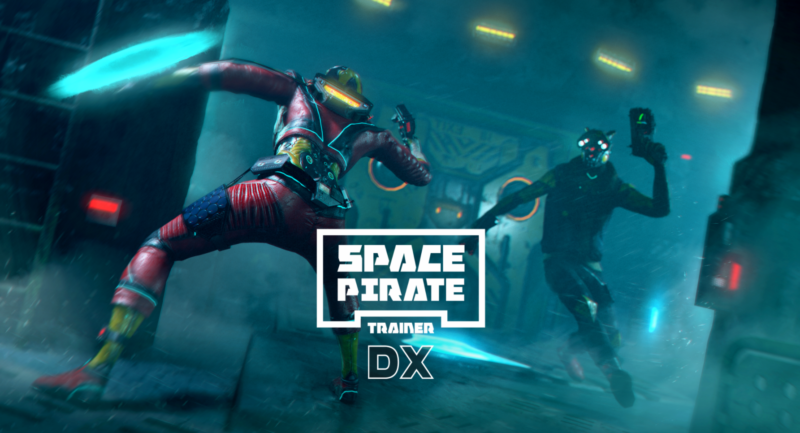Pew pew pew —
Space Pirate Trainer‘s free Sept. update adds mode for 2 players, 100 square meters.
Sam Machkovech
–

Enlarge / Coming September 9. We’ve only played a few minutes of this, but rest assured, Ars Technica will absolutely have a review of this real-world VR laser tag option upon the game’s launch on Oculus Quest VR headsets.
I-Illusions
If you own either of the Oculus Quest VR headset models, you’re about to get one heck of a must-buy gaming option… especially if you have access to a massive play space and a friend with a Quest system.
Space Pirate Trainer, one of the first arcade-shooter games to launch on the HTC Vive VR system in 2016, has continued receiving support on newer VR systems in the years since. The game’s next update, launching on September 9, is its biggest yet—and it’s entirely free for existing game owners. Dubbed Space Pirate Trainer Arena, the long-teased mode is currently an Oculus Quest exclusive, and it requires a massive play space and up to two untethered VR systems to enable real-world laser tag.
In the real world, you and a friend will stand on opposite sides of a large play space, like an indoor tennis or basketball court, and map out a Quest “chaperone” space for your system, no smaller than 10 m x 10 m (33 ft x 33 ft). Once the game starts, onlookers will see the two of you flailing around with headsets, looking like danged fools. In the VR space, however, your and your friend’s play will sync up, and you’ll each see a far more complicated virtual battlefield full of walls, hallways, and other architecture, as if you’re inside an elaborate laser tag arena—with the object of finding and blasting your opponent before they do the same to you.
Cheating, by lifting your headset to examine the real world, won’t really work. You still need to confirm line of sight on your opponent in the virtual world to line up a shot. Nice try, though, jerk.
Whaddya wanna lug: Headsets or cardboard boxes?
This gallery is made up of captures from Space Pirate Trainer DX‘s new “Arena” mode. As such, they’re shaped similarly to lenses in a VR headset. Here’s the beginning of a fight and a peek at your foe on the battleground’s opposite side.
Some serious Quake 1 vibes in this arena.
Shields as an option.
I bet these explode.
When you take damage, or you try to walk through a VR wall, the game will black you out and ask you to run to a teleporter to spawn back in.
I-IllusionsA VR-perspective peek on menus.
Where are you?
Danger incoming.
An animated GIF of how one of the outdoor battling arenas looks.
Animated GIF of single-player action inside Arena’s maps.
Animated GIF of single-player action inside Arena’s maps.
The mode’s aesthetic resembles the original Space Pirate Trainer, albeit shifted into an indoor laser tag universe, and as the above gallery hints at, the VR version includes five battling arenas, each designed with entirely different hallway layouts and hiding places. Players can also build their own levels with a built-in editor. As a result, your enjoyment can be boosted by concocting new battling arenas out of thin air—which owners of plastic laser tag toy sets can’t necessarily do without lugging around a lot of cardboard boxes.
If you happen to have a large garage or otherwise sizable battling space at your home, you can elect to play by yourself and connect to other game owners online or test out the mode’s single-player challenges. The catch here is that any sessions with a real-life friend within the game’s “Co-located Arena Mode” require both players to connect to the Internet to handshake with SPT‘s servers before the system transfers the battling to a local peer-to-peer protocol. (The devs at I-Illusions pointed Ars to this article explaining how such a system will work on a technical level.) We’ll be testing exactly how much this system affects the game’s laser tag latency—and whether we face any issues connecting newer Quest 2 headsets to older Quest 1 models for such two-player battling.
And if you’re nowhere near a massive play space, the game’s September update includes another new online-versus mode that may be more up your alley. It more closely resembles the original Space Pirate Trainer single-player experience, with waves of enemies descending on you Galaga-style. Now, though, a second player is in the same virtual room as you and is contending with their own waves of enemies. Shoot the enemies targeting you (colored red) while avoiding the enemies targeting your opponent (colored green), and see who can last the longest.
Both modes are already intriguing in my very brief preview tests, and I’ll have more on the complete package, dubbed Space Pirate Trainer DX, once it formally launches on all Oculus Quest systems on September 9.
A special version of Dead & Buried, a VR gun-battle game, running in a whopping 4,000 square-foot space at Oculus Connect 5.
Sam MachkovechA wider-angle shot of that demo. Oculus reps stressed that this was still experimental tech and would not be ready for the launch of Oculus Quest.
Sam MachkovechAnother Dead & Buried angle.
Sam Machkovech
This is the first release of any such real-world battling concept on untethered, consumer-grade VR systems, and it’s one I have been dreaming of ever since Oculus reps demonstrated the idea at its Oculus Connect 2018 expo. That demo, pictured above, included a far more elaborate physical setup, complete with cardboard boxes placed exactly where the virtual world’s boxes and debris had been placed so that players could more physically fake a duck-and-cover assault. Plus, it was in a larger space (4,000 square feet) with more players (two teams of three). Space Pirate Trainer Arena is admittedly more scaled-down, but we’ve yet to see VR arcades invest in that 2018 proof of concept with their own massive versus-battling zones.

